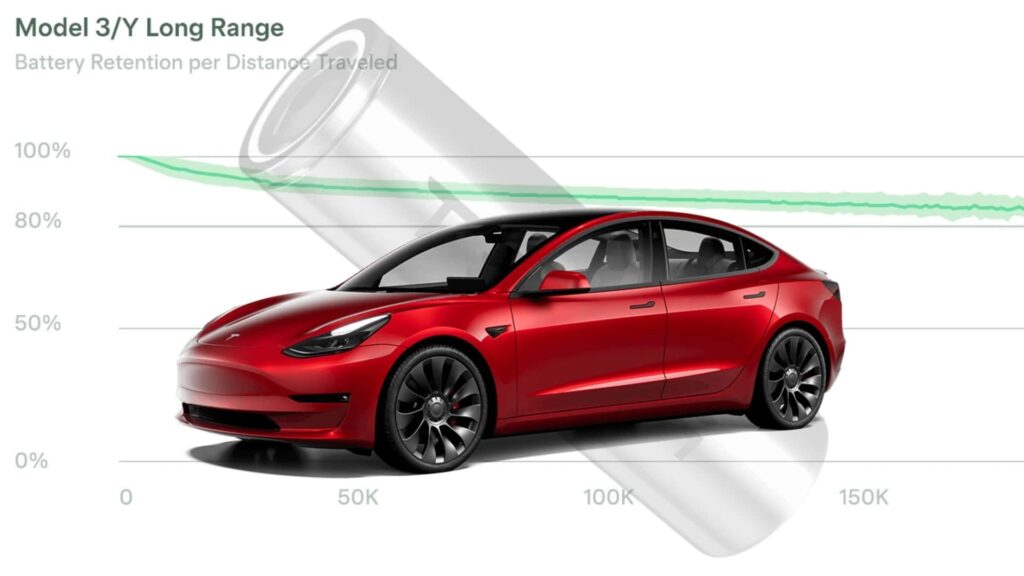RSEV, a reputable source in the EV industry, recently released a new video that sheds light on why you shouldn’t be concerned about your EV’s battery health. The video showcases a detailed analysis of 300 medium- and high-mileage EVs, providing compelling evidence that EV battery degradation is a minor concern compared to the longevity of the car itself.
The analysis revealed that, on average, EVs retained a remarkable 90% of their battery capacity after 90,000 miles. Even more impressively, cars with 130,000 miles still retained 85% of their initial battery capacity. This data suggests that EV batteries degrade slowly, with many examples of vehicles exceeding 200,000 and even 300,000 miles while maintaining 80% capacity or more.
A key takeaway from the analysis is the degradation curve of EV batteries, which shows a gradual decline in capacity after the initial years of use. Most modern EVs come equipped with a hidden “buffer zone” that compensates for lost capacity, ensuring that the usable range remains consistent even as the battery degrades over time.
Furthermore, the data set used for the analysis primarily consisted of cars coming off a lease, which typically involves high mileage within a short period. This means that the analyzed EVs were subjected to rigorous use, including consistent DC fast charging and heavy driving year-round. Despite these challenging conditions, the EVs in the study demonstrated impressive battery health, indicating that modern EVs are built to withstand demanding usage patterns.
It is also worth noting that the analyzed EVs were predominantly 2021 or 2022 models, and battery pack quality has significantly improved since then. As EV technology continues to advance, newer models are expected to exhibit even greater longevity and reliability.
In conclusion, the data presented by RSEV provides reassuring evidence that EV owners can have confidence in the durability and longevity of their vehicle’s battery. With advancements in battery technology and ongoing improvements in EV design, concerns about battery degradation should be minimal for most modern EV owners. The product that was on sale in 2018 represents an earlier generation of battery production and management technology, resulting in the worst performance in the set. This particular product, although on sale, lags behind in terms of battery efficiency and performance compared to more modern options available in the market.
As technology advances, newer electric vehicle (EV) batteries rarely fail, as indicated by a recent study. This is a significant improvement compared to earlier generations of batteries that were prone to degradation and failure over time. The study found that modern EV batteries can outlast a vehicle’s lifetime with minimal degradation, showcasing the progress made in battery technology.
The concern over the disposability of EVs as consumer electronics devices with predetermined expiration dates has been alleviated with the advancements in battery reliability. Companies like Tesla have made significant strides in battery longevity, with some of their batteries lasting over 300,000 miles. This is a testament to the durability and reliability of EV technology, dispelling the notion that EVs are short-lived and disposable.
The transition to EVs has brought about a new era of vehicle reliability, where simpler designs and fewer moving parts contribute to increased longevity. While some automakers are still refining their EV technology, the overall trend is towards more reliable and long-lasting vehicles. The days of worrying about powertrain failure at 150,000 miles are becoming a thing of the past, with EVs paving the way for a future where high-mileage vehicles are the norm.
In conclusion, the evolution of battery technology in EVs has led to increased reliability and longevity in electric vehicles. The performance of older generation batteries may pale in comparison to modern advancements, but the overall trend is towards more durable and long-lasting EVs. As the industry continues to innovate and refine EV technology, the days of disposable consumer electronics vehicles are fading, making way for a future where high-mileage EVs are the new standard.

